The COVID pandemic changed the way UK B2B companies run their business.
Buyers have come to expect digital self-service and remote interactions with sales reps.
Sellers are adopting new tech, spending less time selling and more time researching new opportunities to engage with prospects.
This is true not just for small companies, but also for selling to large enterprises and finding new prospects.
In fact, nearly 90% of B2B decision-makers expect the remote digital model to be the “new norm”, with 3 in 4 decision-makers believing that the new model is as effective (or more so) when compared to pre-COVID-19.
In this article, we look at the most important UK B2B sales statistics released over the past year, the stories behind them, and how they’ll impact your sales organisation in 2023 and beyond.
Key statistics from the UK sales industry
In the UK, B2B is a big industry.
According to research, nearly 40% of UK companies derive all/the majority of their income from B2B activity. A further 42% are blended businesses, with some of their income coming from B2B partnerships.
Revenue wise, this means that B2B accounts for £1.7 trillion (44%), of the UK’s business turnover and £21.78 billion in corporate tax.
The valuation of eCommerce B2B sales in the UK totals £159.3 billion. That’s forecast to exceed £188 billion by 2024.
Organisations are working to keep up with a swelling market size. Over the last year, the number of sales operation roles has grown 2.7x faster than traditional sales roles.
That’s good news for salaries:
The average annual salary for a B2B sales representative is now £28,855 per year, with the chance of earning more by meeting targets--which for some companies is uncapped.
COVID forced B2B buyers to go digital and self-service
The UK B2B landscape continues to shift towards digital and self-service. It was happening before COVID, but now it’s accelerated!
Remote interactions are becoming a dominant component when selling to both small businesses and large B2B companies.
The most surprising takeaway? Don’t expect in-person sales coverage to make a bounce back. Fewer than 25% of B2B buyers in the UK ever want to interact with reps in person again--even after the pandemic ends.
The shift to online-only means B2B buyers are very comfortable buying without face-to-face interaction. The vast majority (96%) claim they will make a purchase in a digital self-serve, end-to-end portal, spending $50,000 or more in one transaction.
Despite the idea that big-ticket sales require human contact, 20% of B2B buyers said they’d be willing to spend more than $500,000. A small percentage would also spend more than $1 million in a fully remote/digital sales model.
How do B2B companies in the UK prefer to buy?
As the new normal set in, video conferencing became the most critical channel for buyers involved in B2B decision-making processes. Online video meetings are preferred over audio or phone by 3 out of 4 B2B buyers.
(This isn’t just a sales statistic: Zoom’s number of daily active users skyrocketed around the time lockdowns were introduced.)
Even more interestingly, very few field sales teams are still meeting in person. Just 16% of B2B sales departments in the UK have a face-to-face team that communicates with buyers in person.
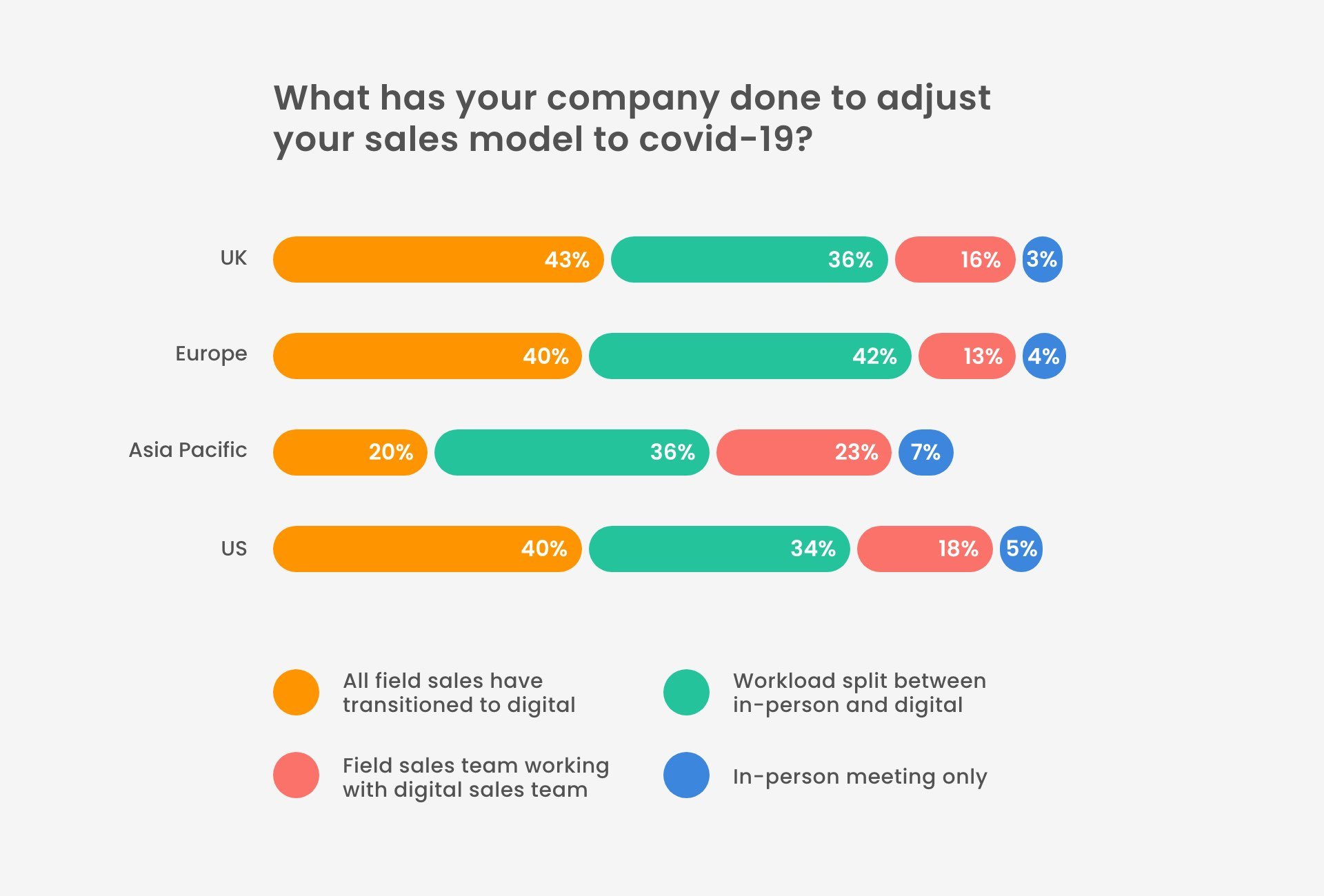
Despite the fact that most areas are tentatively reopening and in-person sales becoming an option once again, B2B buyers aren’t eager to book in-person meetings. It’s clear that buyers prefer a cross-channel mix, rather than just one channel, by choosing in-person, remote, and digital services.
In fact, 2 out of 3 buyers prefer remote human interactions or digital self-service to achieve a number of tasks, including:
- Identifying and researching new suppliers
- Considering and evaluating new vendors
- Ordering
- Reordering
Because of this, eight in ten B2B leaders say that omnichannel is more or as effective than traditional methods. That’s a figure that rose from 54% at the start of the pandemic to 83% in February 2021.
Ready for another surprising stat?
Despite the obvious omnichannel approach that modern buyers are using, our own research – based on responses from 268 UK sales professionals - shows that just 20% of UK B2B sales reps use a multi-channel approach to engage with new prospects.
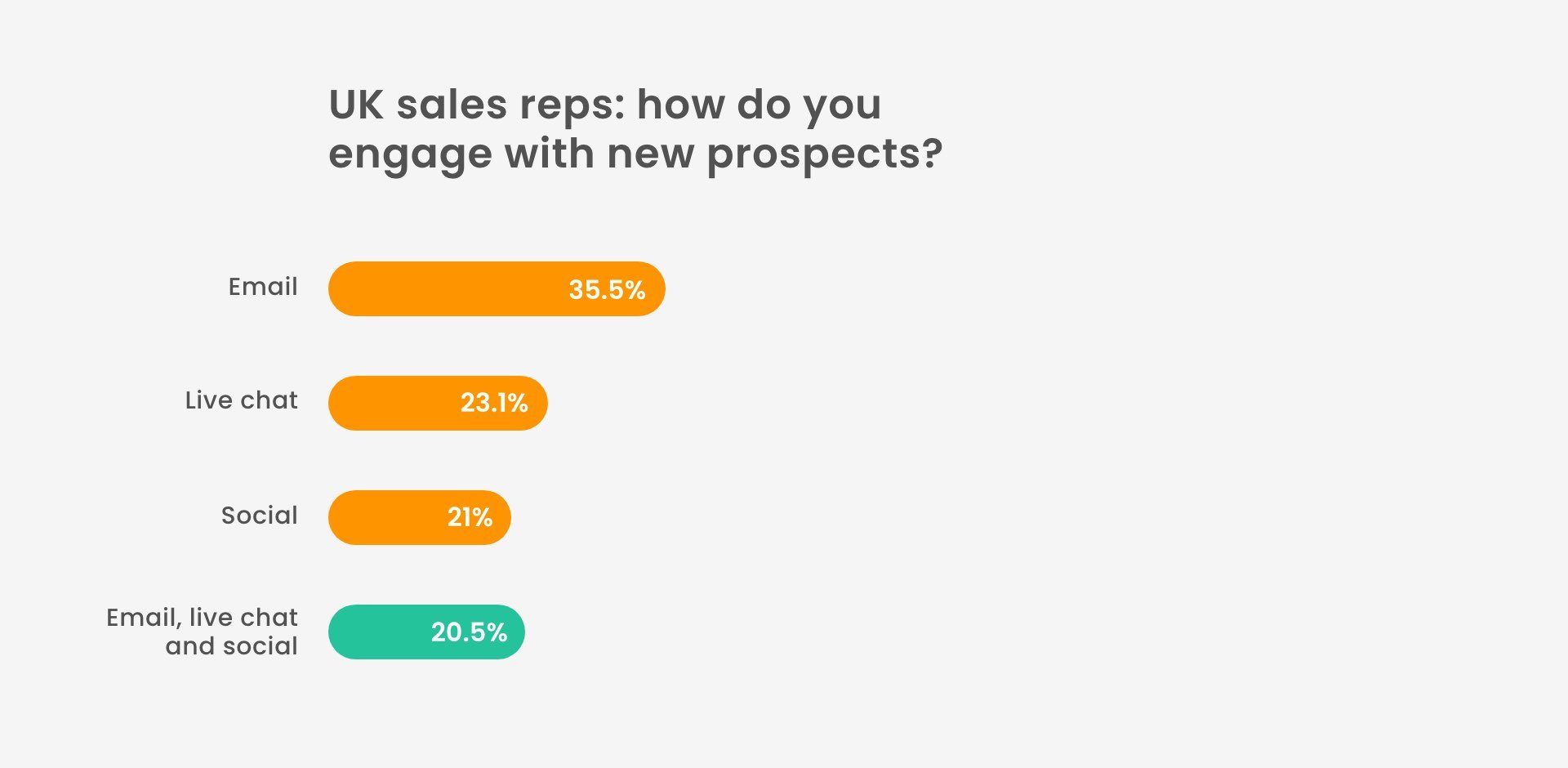
Combing all 3 - Social, email, and live chat - is falling on the backburner.
When it comes to social media, LinkedIn leads the way. More than half (51%) of B2B sellers ranked LinkedIn as the best social media platform for providing unique customer data for social selling strategies. Not surprising, right?
More than 80% of UK B2B sales reps are active or very active on LinkedIn.
However, only 21% of UK B2B sales reps have a social selling strategy.
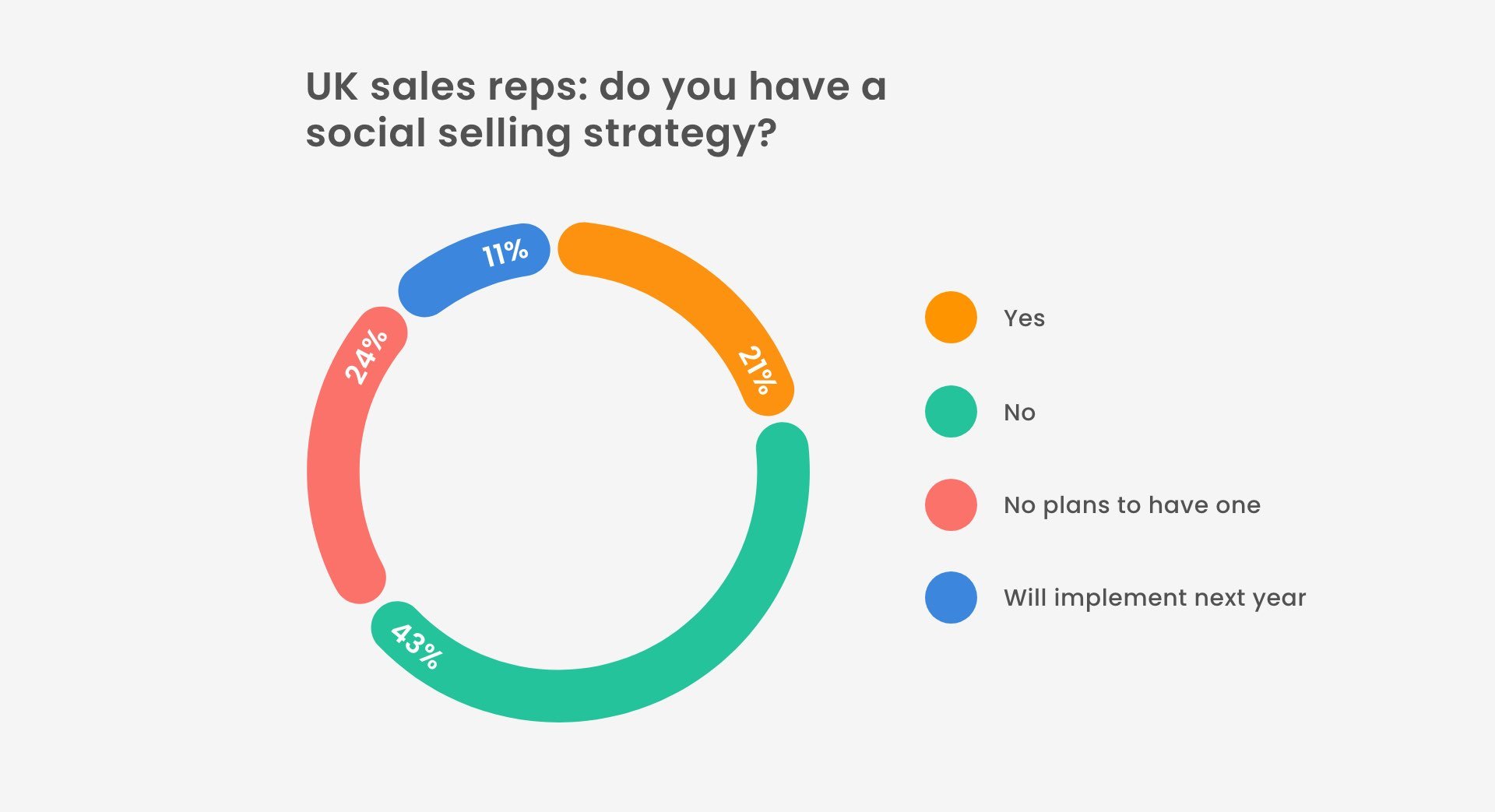
This new omnichannel, self-serve model is working so well that companies plan to increase budgets by 15% to improve digital sales resources over the next five years.
Technology is crucial for UK B2B sales teams
As the B2B tech tools industry continues to grow, UK sales teams are taking the initiative to build tech stacks to manage their work.
Half of all sales organisations in the UK have responded to the pandemic by increasing their investment in sales tech, with another 52% saying they will grow their investment over the next year.
Why? Because 57% of UK sales professionals say, technology is important to closing deals, while 38% say it is very important. It’s why almost a third are applying technology to sales planning, engagement, and enablement.
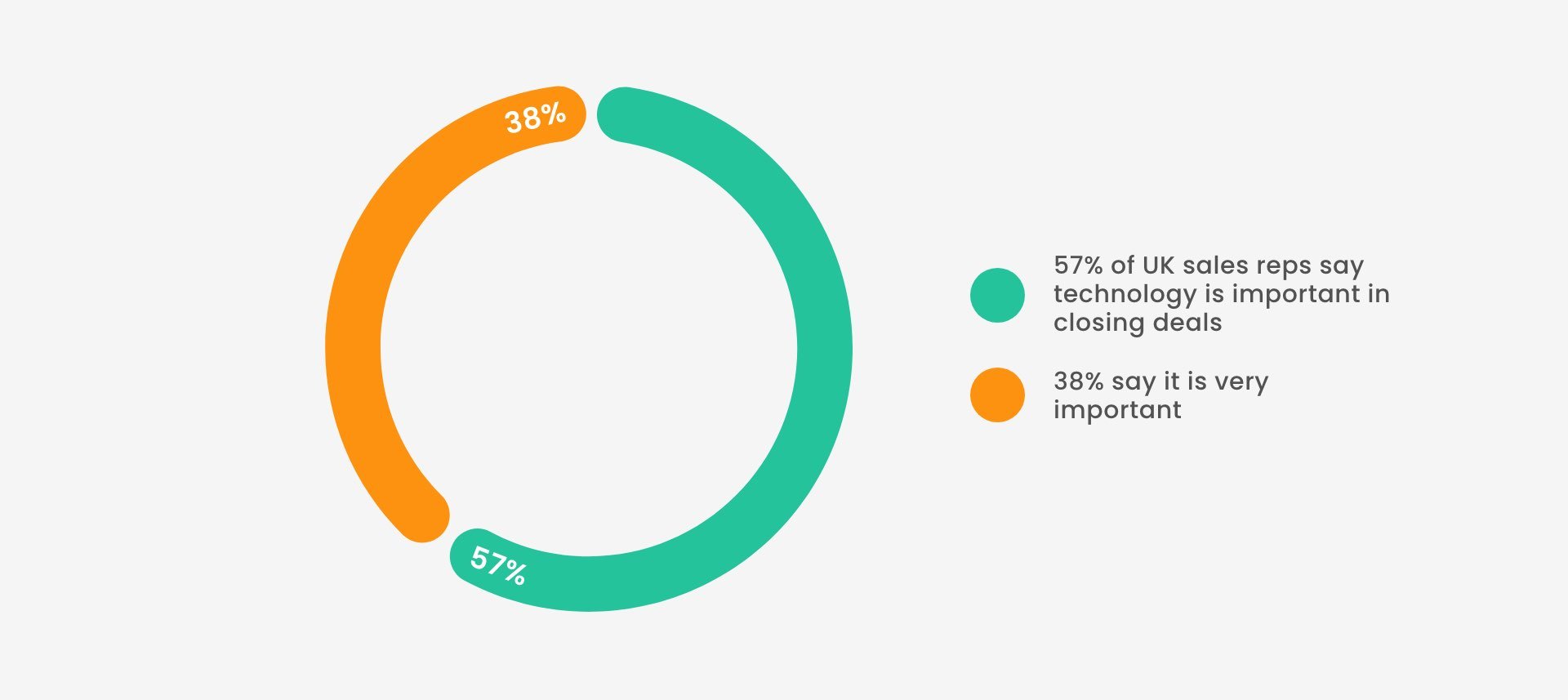
Big investments are being made in sales intelligence tools which provide data and insights to prioritise leads and personalise outreach. They can also be integrated further with e.g., open platform solutions.
Some 75% of UK B2B sales organisations increasing their investment in these tools moving forward. According to LinkedIn, the top technologies are:
- CRM tools (42%)
- Visual collaboration / demo tools (41%)
- Sales intelligence (40%)
- Sales planning (37%)
- Sales engagement (36%)
- Sales enablement (30%)
- Sales coaching (28%)
Additionally, 52% of UK B2B sales reps have never used digital signatures in their sales process (while only 18% have switched over to digital signatures only).
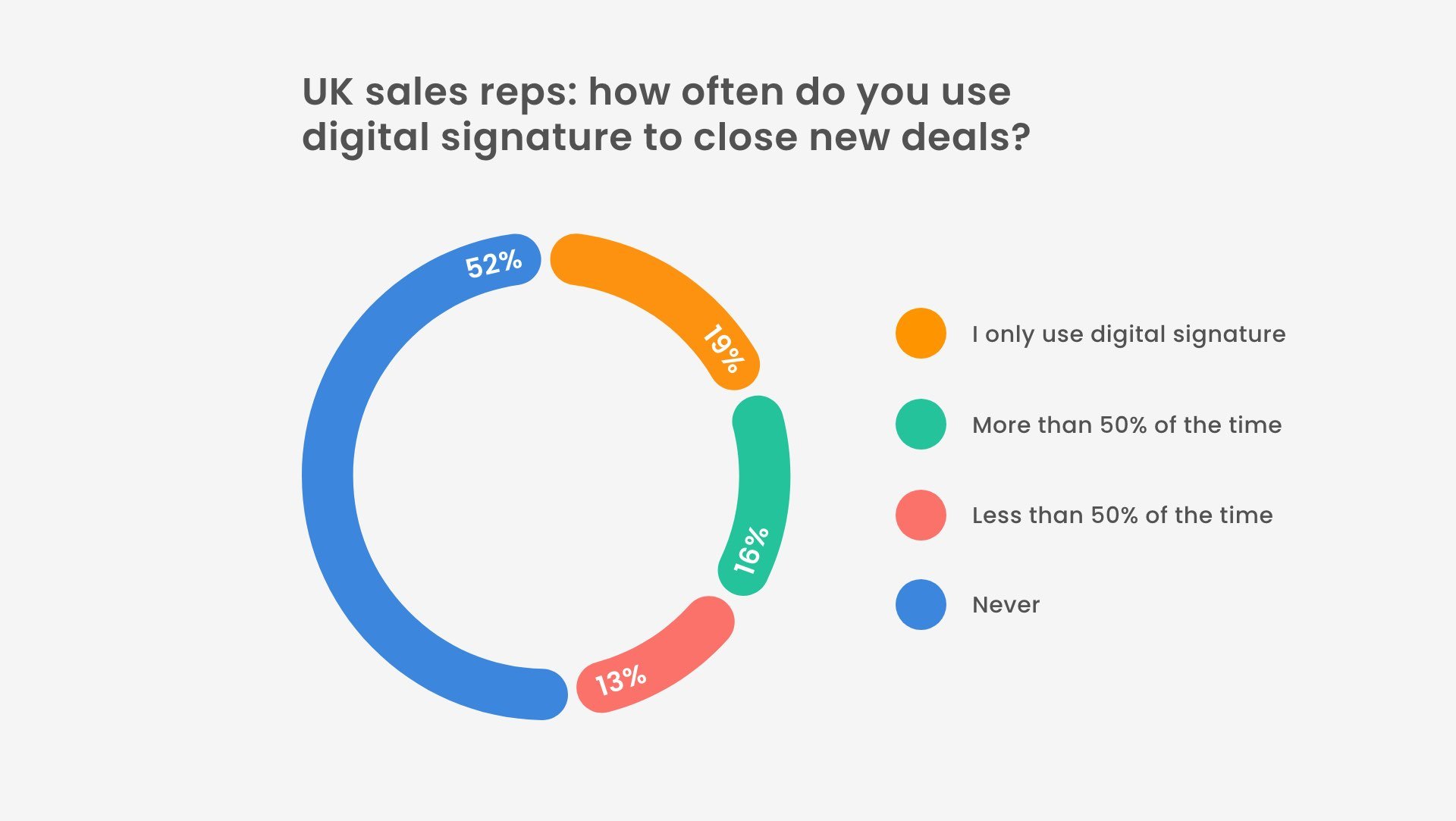
Nearly three out of four UK sales professionals plan to increase their use of these tools over the next year. Roughly a third expect usage to grow significantly in the same time frame.
UK B2B buyers don’t like cold calls or emails
We’ve already discussed the fact that B2B buyers are shying away from in-person meetings. The sway away from face-to-face contact mirrors itself in other traditional forms of sales contact, too.
Half of UK buyers say repeated cold calling and email is the #1 disqualifying sales activity.
Nobody wants to be pestered by salespeople--hence why most UK B2B sales teams are moving away from cold-calling. They’re focusing more on brand building and customer experience instead.
UK sales professionals are responding by offering self-serve buyer journeys. They are also spending less time selling, and more time investing in research opportunities and finding new ways to engage with prospects.
The average sales rep in the UK spent 36% of their time selling products and services just before the pandemic. Today, that number has dropped to 28%.
As salespeople shift their role as sellers to providers, they are adopting new qualities to meet buyer expectations. Showpad polled UK B2B buyers and identified the five most important qualities UK sales reps should have include:
- Helpful and informative (71%)
- Exceeds customer support expectations (69.6%)
- Knowledgeable about the industry (68%)
- Professional (67.6%)
- Ability to prove cost savings (67%)
These qualities are used to support a longer sales process for buyers. While more than a third (40%) of UK respondents say that their buying process has remained the same over the past 12 months, more than half (53%) said their buying cycle is getting longer.
In fact, almost a fifth (16%) say it has increased significantly.
One of the best ways to support buyers through the purchase process is to provide timely responses to sales inquiries, which 72% of UK B2B buyers rated as very or extremely important.
But guess what 34% of UK sales reps reply to prospects the following work day (longer, if it’s on a weekend). The average response time is between 2 to 12 hours (clearly not good enough).
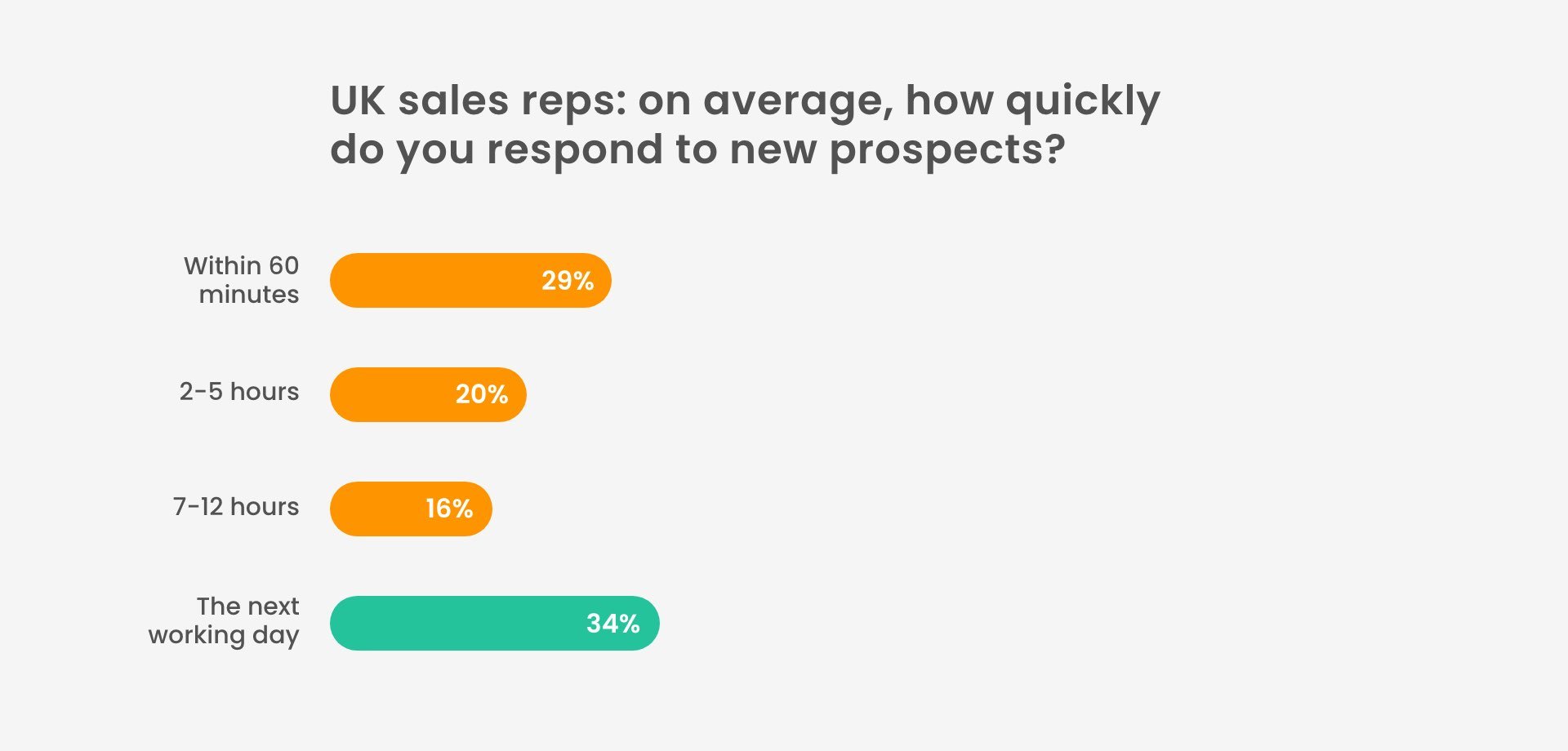
Content is leading B2B sales teams to more sales
Search engines are the first port of call for most modern customer journeys.
On average, B2B customers will spend up to 20 hours researching before they contact a sales rep. This time spent researching increases as the price tag of the product or service does.
The more expensive the purchase, the more time buyers spend conducting research.
Makes sense, right?
However, one-third of B2B buyers say that when they research, they can’t find the information they need. Another 37% say not enough information is applicable to their direct purchase, and 29% said the information they did find didn’t prove ROI.
Invest time into the content formats that B2B buyers consider the most important during their sales process, such as:
- Technical specs (53%)
- Case studies (49%)
- Streaming video (38%)
- White papers (34%)
- Infographics (31%)
If you’re aligning your sales and B2B marketing strategy, you’ll likely find that you have a lot of content ideas to provide leads with the information they need before making an inquiry.
However, more content isn’t better.
B2B sales reps need to focus on making better content that’s relevant and provides value to buyers--especially considering 86% of buyers find it overwhelming when provided with more than 10 pieces of sales content. Another 42% are overwhelmed with more than five!
It’s also important to note that buyers aren’t always turning to your organisation's content first.
In fact, the majority of buyers (64%) conduct research on vendor websites before they contact a sales rep. Buyers are also consulting industry or peer reviews (59%) on sites like G2 and Capterra, or have conversations with peers (49%), indicating that peer feedback plays a large role in research.
In short: you want to make sure your brand’s reputation is solid everywhere on the internet...
…not just on your own website.
UK B2B sales organisations must improve their ecommerce experience
Sales teams in the UK who want to succeed will need to invest in their online sales experience. From payment options to delivery times for products, B2B buyers expect a seamless journey from start to finish.
According to data from Statista, five of the most important factors UK B2B buyers look for when making a purchase are:
- Price (32%)
- Reputation (25%)
- Payment terms (25%)
- Product or service expertise (21%)
- Ability to customize the product or solution (20%)
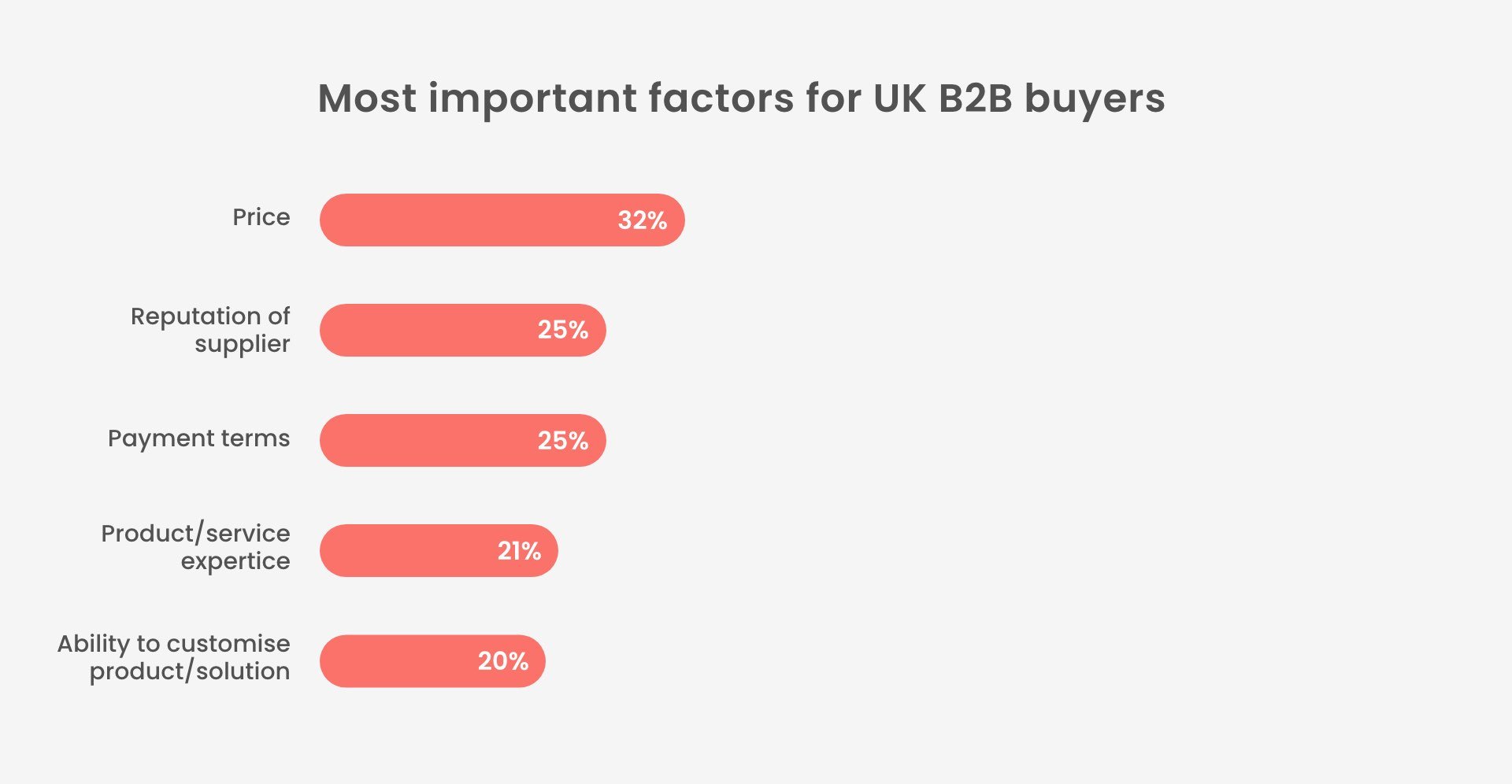
At 25%, payment options are a big deal for B2B buyers in the UK.
According to TreviPay, 9 out of 10 B2B buyers research the payment options a company has before buying from them. More than half of them agree vendors should offer additional payment options beyond credits to improve the buying experience.
On top of that, 74% of B2B buyers would make a purchase with a competitor if their existing vendor couldn’t keep up with their buying expectations.
Considering 48% of B2B buyers don’t complete a purchase because their preferred payment method wasn’t an option, you want to personalize the buying experience as much as possible.
Meet (or beat) those expectations by offering:
- Preferred invoicing terms: 82% of B2B buyers are more likely to choose a vendor (over others) if a vendor offers invoicing at checkout with 30-day, 60-day or 90-day terms.
- Custom pricing options. 56% of B2B buyers place a high priority on custom pricing.
- Fast onboarding: 77% of B2B buyers say before they can purchase an item, it takes more than a day to be onboarded by the vendor.
Conclusion
As these UK sales statistics show, the B2B industry in the UK is undergoing rapid growth!
Buyers are demanding more from the B2B vendors making their shortlist. So, invest in improving remote interactions with prospects and making your digital self-service portal easy to use.
Build the right tech stack for sales teams so they reach new customers across various channels and create a content hub that gives prospects the information they need to make a buying decision.



